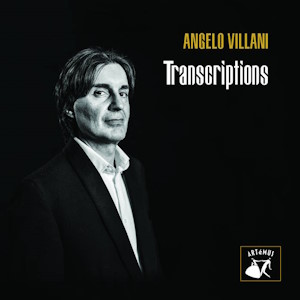
Angelo Villani (piano)
Transcriptions
rec. live, 2021, Frihavnskirken Østerport, Copenhagen
Artémus 0001 [59′]
That Angelo Villani’s passion for piano transcription is influenced by Liszt is clear from the photo of the Hungarian master on the inside cover of the booklet and Villani’s discussion of Liszt’s style and range in the genre; indeed Liszt appears here in a powerfully dramatic performance of his second Lègende, the depiction of St. Francis de Paola walking on the water when the ferryman refuses him passage over the Straits of Messina. Alone amongst the pieces here this is less of a transcription, more of a filling out of the texture, adding octaves or moving them to a lower register and using the pedal and the acoustics of the recording venue to create a tempest of quite extraordinary proportions; it is telling that Villani at the age of 18 considered the live performance by Ervin Nyiregyházi to be the first successful recording of the work. A lot of the Hungarian’s performance can be heard here, with the capabilities of the instrument taken almost the limit. It is certainly impressive but also rather remorseless once the tempest takes hold and one wonders if the ferryman would have even taken his boat out if he suspected a storm of these proportions was imminent.
The rest of the album consists of transcriptions from orchestral, vocal and chamber music and opens with the first movement of Franck’s Piano Quintet in F minor. Villani has shaped this transcription over many years, working out how to interweave the strings into the piano texture – Franck’s piano concerto in miniature as Villani describes it – and I would say that he has been successful. Judicious changes of register do not take away from the melodic impact and Villani has not overdone the tremolandi in his efforts to recreate the sustained string sound.
I am less taken with the Lacrimosa transcription at least from a performance aspect. It is based on Kyril Saltykov’s transcription as played by Maria Yudina and is as effective as anything here but I find Villani’s dislocation of the notes in the main melody, whether for dramatic purpose or to better delineate the melody, quite distracting. Dido’s lament works better in this respect and the poignancy of the original is maintained beautifully. This is a new recording of a transcription that originally appeared on Villani’s debut album (Sonetto Classics SONCLA001). Such simplicity of expression is also found in Hugo Wolf’s Um Mitternacht, where Villani easily brings out the melody from the rather dense, undulating accompaniment, Edelweiss and Crépuscule, the song by Massenet that was adapted for Kenneth MacMillan’s ballet L’histoire de Manon. This also appears in Stephen Hough’s transcription on his French Album (Hyperion CDA67890 review) and if I prefer Hough’s slightly faster and ethereal version that does not take away from Villani’s warm hearted playing.
In a more complex vein is Villani’s sultry take on Weill’s Bilbao Song, a very far cry from Lotte Lenya’s gritty up tempo original. Villani started out basing his transcription on Bernie Leighton’s arrangement from Woody Allen’s film Another Woman but as he admits it eventually developed into something more inspired by Rachmaninov; the result is gloriously rich and romantic. If the jazz element has gradually retreated into the background in Weill’s song then Teach me Tonight as played by Errol Garner at his famous 1955 Concert by the Sea brings it right back in this affectionate tribute. Drums and bass may be absent, as is Garner’s sub-vocalising but Villani captures the style remarkably and very effectively. Two improvisations complete this recital, both based on the story of Romeo and Juliet. The second, which fades in as if it is just part of a larger improvisation is the familiar theme from Nino Rota’s score to Franco Zeffirelli’s 1968 drama and is played in a low key and simple style. The first is similar to a Liszt paraphrase in which he would condense elements of longer work into a compact, dramatic evocation. Villani certainly captures much of what we expect of the piece from its brooding dark opening to the grand passion of its love theme.
Villani’s grand sense of drama, fine lyrical sensibilities and a passion that at times tests the limits of the instrument make this a distinctive recital; I love the music’s grand sweep and huge gestures, harking back to players from the early 19th century though some may occasionally find it a bit overwhelming. The recording captures the piano well along with the very open acoustic of the Danish church venue. More transcriptions are promised – I am eager to hear them.
Rob Challinor
Availability: Bandcamp
Contents
César Franck (1822-1890) arr. Angelo Villani
Piano Quintet – 1st movement (1878-79)
Wolfgang Amadeus Mozart (1856-1791) arr Kyril Saltykov (1914-1939) and Angelo Villani
Lacrimosa from the Requiem (1791)
Henry Purcell (1659-1695) arr. Angelo Villani
Dido and Aeneas – Dido’s lament (1688)
Jules Massenet (1842-1912) arr. Angelo Villani
Poème Pastorale No.5 – Crépuscule (1884)
Piotr Ilyich Tchaikowsky (1840-1893) arr. Angelo Villani
Reminiscences from Romeo and Juliet (1880)
Hugo Wolf (1860-1903) arr. Angelo Villani
Mörike Lieder No.19 Um Mitternacht (1888)
Kurt Weill (1900-1950) arr. Angelo Villani
Bilbao Song from Happy End (1929)
Franz Liszt (1811-1886) arr. Angelo Villani
Légende No. 2 St Francis de Paola walking on the waves (1863)
Gene de Paul (1919-1988) and Sammy Cahn (1913-1993)
as played by Errol Garner (1919-1977) at the Concert by the Sea transc. Angelo Villani
Teach me Tonight (c.1953)
Nino Rota (1911-1979) arr. Angelo Villani
Improvisation on Romeo and Juliet (1968)
Richard Rodgers (1902-1979) arr. Angelo VillaniImprovisations on Edelweiss


















